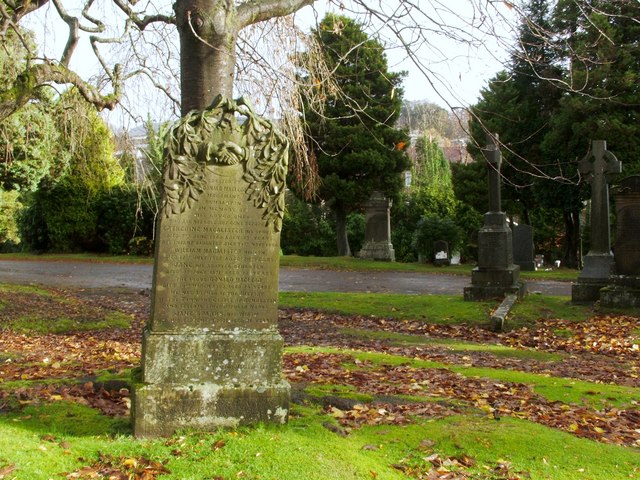NS4075 : The gravestone of Donald MacLeod
taken 14 years ago, near to Bellsmyre, West Dunbartonshire, Scotland

The inscription now also commemorates Donald MacLeod himself, who died on the 20th of March, 1900, aged 74, and his widow, Jane Sparks, who died on the 11th of September, 1901, aged 71.
The text also notes that "he was author of the History of the Town and Castle of Dumbarton and several other popular works".
One of these works was "The God's Acres of Dumbarton", which is (mainly) about Dumbarton Cemetery, where the photograph was taken; the book provides biographical details of many of the people who are buried there. It also includes a description of this memorial; in that description, the author expressed the wish that he himself might also be buried at this spot, and this is indeed what happened.
The Lennox Herald newspaper, in its issue of the 24th of March, 1900, contains Donald MacLeod's obituary, on which the following summary is based (it has been supplemented with further biographical information supplied by an article in the 30th April, 1892, issue of the same newspaper).
According to his obituary, Donald's parents originally came from Coldingham Shore (now called St Abbs – NT9167). However, according to the 1892 Lennox Herald article, Donald himself was born at Edinburgh, on the 4th of October, 1826. The family moved to Dumbarton in 1830; Donald was educated at Dumbarton Academy, and, in 1841, he was apprenticed to his father.
He worked for a short time in Kilmarnock (1844), and then in Manchester. There he witnessed huge processions, made up of those protesting against the Corn Laws (the Anti-Corn Law league had been set up in that city in the 1830s). In 1848, he saw for himself public anger over the Corn Laws boiling over, resulting in the wrecking of mills, the looting of shops, and the destruction of private property.
During this same general period, Donald attended classes of the Mechanics' Institute of Manchester. Later, he worked in Glasgow, and, finally, he joined his father's firm in Dumbarton. He enlisted in the Mechanics' Institute of Dumbarton (he would become its secretary, and, later, its president).
In the 1850s, his father, John, was a successful hatter in Dumbarton. Donald learned the family business, and eventually succeeded his father in it. He prospered in this work, allowing him to relinquish it (c.1885) and thereby to devote himself more fully to literary pursuits. His first book, on the history of the castle and town of Dumbarton, had already been published in 1875; it was to appear in a second edition, and, at the time of his death, MacLeod was engaged on a third edition of that work. Altogether, he was the author of about a dozen works (on a personal note, I would like to acknowledge here the great debt that I owe to Donald MacLeod, whose works have been, and continue to be, invaluable to me when researching the history of this area).
In addition to his writing, MacLeod served as a town councillor. He proved to be popular in this role; shaped by his earlier experiences in life, he had a reputation for "siding with the masses as opposed to the classes". He had also been a President of the Dumbarton Burns Club. In addition, when various rights-of-way were being challenged in the district, he was among those who defended their continued use by the people.
Regarding the newspaper in which his obituary was published, it was noted that "he was also a frequent contributor dealing especially with archaeological subjects or with other matters of interest to the community".
In 1900, he was afflicted with influenza. Complications arising from this led to his death, after a four-week illness, at his home in Balclutha Lodge, Dumbarton. For Balclutha Lodge, see NS4075 : The start of Boghead Road.
The cemetery was formally opened on the 4th of October, 1854, replacing the overcrowded parish churchyard. See the Geograph article "Dumbarton Cemetery" – Link – for a detailed discussion. For biographies of many of those buried here, and for descriptions of their memorials, see Donald MacLeod's "The God's Acres of Dumbarton" (1888), and the same author's "Dumbarton: Its Recent Men and Events" (1898). By 2010, there was concern that Dumbarton Cemetery would run out of space within a decade; New Dumbarton Cemetery – Link – was subsequently created uphill from the existing cemetery, and opened at the end of December 2015.